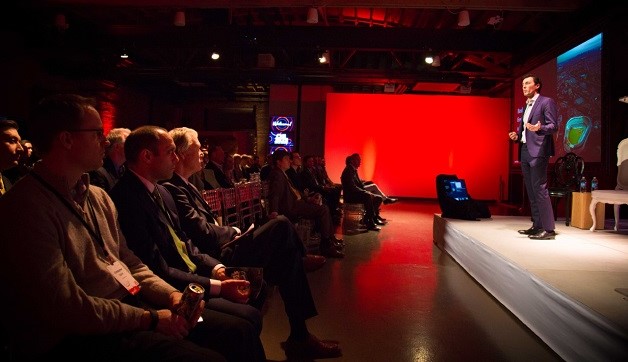Multifamily Distress Could Head for 'Real Estate Armageddon'
Lynd Group weighs in with GlobeSt.
 Chris Kelly, co-founder of NYC-based Convene, addressed JLL’s Chicago 2025 event, held last week on the city’s Near West Side.
Chris Kelly, co-founder of NYC-based Convene, addressed JLL’s Chicago 2025 event, held last week on the city’s Near West Side.CHICAGO—The office environment has undergone some profound changes in the last decade. What we think of as the traditional workspace has in many locations given way to collaborative arrangements that allow employees to work together in a variety of ways. Furthermore, amenities have assumed far greater importance for firms competing for talent. The rooftop decks and fitness clubs in today’s office spaces would astonish people from the not-so-distant past. But these transformations are not yet finished, and in some ways are just getting started.
“We believe the largest landlords in the world are about to get into this game,” Chris Kelly, president and co-founder of Convene, which creates amenity centers for entire buildings and portfolios, said last week at JLL’s Chicago 2025 forecast event. That is, some now recognize they can help even their smallest tenants compete for talent by providing an array of amenities and on-demand, flexible services. In a way, landlords will aim to become a true brand, a name familiar not just to those that sign leases, but also the employees that work in their buildings.
*May exclude premium content
Already have an account? Sign In Now
NOT FOR REPRINT
© 2025 ALM Global, LLC, All Rights Reserved. Request academic re-use from www.copyright.com. All other uses, submit a request to [email protected]. For more information visit Asset & Logo Licensing.
Lynd Group weighs in with GlobeSt.
When property performance doesn’t meet proforma, investors lose. Gathering the correct data during due diligence goes a long way towards keeping investment properties on track.
Through the first half of 2023, leases of 100,000 square feet or greater accounted for 15.4% of all leasing activity by square footage.
Trend Report
Sponsored by MSCI Real Assets
2025 February US Capital Trends & Analysis
How is investment and capital activity shaping up for the start of 2025? Discover key trends in capital flows, lending dynamics, and the emerging path to recovery in 2025.
Guide
Sponsored by Placer.ai
The Return to Office: Recovery Still Underway
Are you noticing unexpected shifts in office occupancy and commuter behavior? This report reveals how evolving work patterns are challenging CRE brokers and offers crucial, data-backed insights for 2025. Discover a detailed analysis of office visit fluctuations, an in-depth look at midweek work trends, accurate forecasts for market recovery, real-world examples to inform strategic decisions, and actionable metrics to guide client advising. Download your copy today!
Report
Sponsored by Building Engines
The State of Commercial Property Management Technology in 2025
Commercial property teams are navigating changing times where technology plays a crucial role in operations, tenant satisfaction, and sustainability. This report, based on insights from 370 industry professionals, reveals the biggest priorities, challenges, and opportunities for CRE technology adoption in 2025. Don’t miss it.
 Copyright © 2025 ALM Global, LLC. All Rights Reserved.
Copyright © 2025 ALM Global, LLC. All Rights Reserved.



